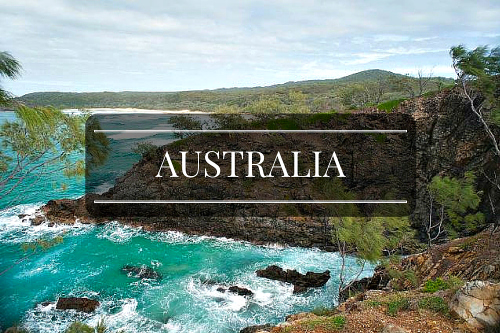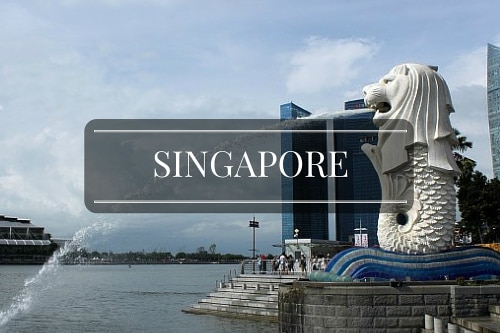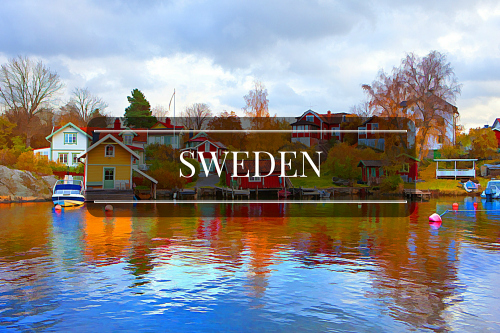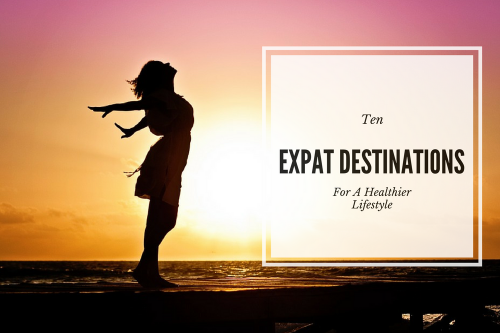For many expat families the move abroad can often be motivated by an urge to live more healthily, and as it turns out, some places are just naturally conducive to such a lifestyle. Many environmental factors contribute to good health and wellbeing, not least of which are the climate, air quality, food and local culture. Certain locations facilitate regular exercise, cause less stress, and help inhabitants live a longer, healthier, happier life.Many countries also provide residents with affordable and high quality healthcare, which is another important variable to consider. Here are ten destinations where expats agree they have a healthier lifestyle.

Australia is a popular destination for expats and often figures near the top of most lists measuring quality of life and health. There are many reasons for this. Much of the population resides close to the vast coastal area, making healthy outdoor activities and trips to the beach a big part of Australian life. Water sports like surfing and swimming are of course hugely popular, but so are many other outdoor pursuits like hiking, fishing, scuba diving and mountain biking.
The largely warm, sunny climate and clean air encourage people to get out of their homes and take advantage of the many great alternatives available. Australia boasts a stunning national parks system that covers its wide variety of landscapes and features beautiful walking trails. Also, with over two-thirds of the land being utilised for farming, you are never far from nutritious, locally produced fresh fruit, herbs and vegetables, as well as a wide variety of the freshest seafood, meats, dairy products and wines. To boot, Australia has arguably the best healthcare system in the world, to which its residents have universal access. As a result, life expectancy levels are amongst the highest globally – 80.3 years for men and 84.4 years for women.
It’s no wonder then that Australia ranked as high as third in the 2015 Bloomberg rankings of the world’s healthiest countries. According to HSBC’s Expat Explorer survey, nearly three in five (57%) respondents say they are more physically active in Australia than in their home country, compared with only 11% who say the opposite is true. What’s more, it’s also the second best place in the world for improving children’s health and increasing their exercise levels according to 68% of expats living here (twice the global average of 34%).

New Zealand offers a pristine, pollution-free environment full of spectacular natural beauty. A great place to enjoy an outdoors lifestyle, you can choose from high-octane adventure sports such as bungee jumping, skydiving, parasailing and rafting or more serene activities like walking, hiking, fishing, boating and swimming. The options really are endless.
The island nation is ranked first on HSBC’s Expat Explorer Experience league table which measures the overall experience that expats have in their adopted countries. Nearly three in five (57%) of the expats surveyed say they are more physically active here than they were at home (only 15% disagree), and 55% believe their health has improved since moving. The ease of settling into the country, coupled with the scenic landscapes at almost every turn, certainly helps to reduce stress levels. Furthermore, this positive impact extends to their children, who are healthier living in New Zealand according to 76% of expat parents.
healthcare is often free for residents, which is perhaps another contributing factor to one of the longer life expectancies – 83.2 years for females and 79.5 years for males. With a thriving agricultural economy it’s easy to eat healthily here too, with local ingredients and fresh produce available from both land and sea.
Japan too is often cited as one of the healthiest countries in the world, with close to the highest life expectancy levels anywhere – 80.5 for males and 86.8 for females. A big reason for the population’s good health is the traditional low-fat and varied diet which includes lots of lean fish, antioxidant rich seaweed and green tea, as well as many cancer-preventing cruciferous vegetables. If that doesn’t sound appetizing to you, rest assured it’s a delicious cuisine – Japan’s restaurants have the most Michelin stars in the world.
Japanese culture also values the benefits of regular physical exercise. Routine early morning calisthenics are broadcast on public NHK radio and are also incorporated into many school and workday schedules. The natural beauty of the mountains, rainforests and national parks provide plenty of encouragement to get out and about.
The state plays a large part in keeping the nation fit, with a high quality universal healthcare system that is within reach of most residents. Japan ranks fifth according to the latest Bloomberg rankings of the world’s healthiest countries.
Spain’s largely warm, sunny Mediterranean climate is a huge draw for expats. In fact, many studies and polls have found it to be the healthiest country to live in Europe. HSBC’s Expat Explorer report places Spain second on its Experience league table, with respondents enjoying the vibrant local culture and finding it easy to settle there without stress. It’s especially popular with British expats who are looking to escape the dreary weather in the north and live more active, outdoor lives in a new environment. This has a positive influence on their health, with more than three in five (59%) expats living in Spain seeing an improvement. The survey also found that British parents saw a 40% increase in the amount of sport their children play.
As well as the pleasant climate and sunshine, a balanced Mediterranean diet rich in high quality indigenous products like tomatoes and olive oil contributes to the healthy lifestyle. Residents also take advantage of what the World Health Organisation (WHO) ranked the seventh best healthcare system in the world. Spain is amongst the top five countries worldwide in terms of life expectancy (male 80.1, female 85.5) and makes for a great destination to live a long, healthy and stress-free life.
The large longitudinal area covered by the mountainous Italian peninsula creates diverse climatic conditions for the country, but the sunny Mediterranean climes of the south are perhaps best suited to a healthy lifestyle. The fresh, low-calorie Mediterranean diet of fruits, vegetables, nuts, fish and red wine is significant too. The liberal use of olive oil instead of butter is a far better choice for cardiovascular health, as is the inclusion of garlic in many Italian dishes.
Many of Italy’s picturesque towns are built on hilly regions, and so locals have to negotiate a fair amount of steps and climbs in daily life. Families often enjoy a leisurely after-dinner stroll which both relieves stress and fosters a healthy community bond. Bloomberg ranked Italy the second healthiest country in the world, and the healthiest in Europe. The Italian healthcare system was also ranked as the second best globally by the World Health Organisation, so it’s no surprise that the life expectancy here is amongst the highest on the planet too (male 80.5, female 84.8). Expats rated Italy amongst the top ten places to experience in terms of quality of lifestyle according to the HSBC Expat Explorer.

Bloomberg ranked Singapore as the healthiest country in the world and expats don’t disagree with this assessment. The world’s only island city-state ranks amongst the top three destinations in each of the league tables of the HSBC Expat Explorer report, making it the best destination overall for expats. A big reason for this is the excellent quality of life Singapore provides for its residents. Two thirds of the respondents to the HSBC survey felt that living in Singapore had improved their quality of life (the worldwide average for this parameter was only a little over half of respondents), and 55% said that they were more physically active. Most residents can avail of nearby public amenities such as swimming pools, basketball and tennis courts, as well as indoor sports complexes and gymnasiums. Water sports like kayaking, sailing, water skiing and scuba diving are hugely popular recreational activities too.
Expat parents are just as impressed with Singapore’s positive impact on their families’ wellbeing. Close to two thirds say that their children’s health is better than it was in their previous location, and here again, the global average is much lower, at 48%. The World Health Organisation ranked Singapore’s healthcare system the sixth best in the world, and measures the average life expectancy as the third highest in the world (80 for males, 86.1 for females). There’s also plenty to do and see in Singapore and that’s why it continues to be such a great destination for expats who want to live longer and healthier.

It’s not just Switzerland’s excellent universal healthcare system that propels it to near the top of most lists of the healthiest countries. There’s plenty to do in the beautiful outdoors as well, with alpine forests, lakes and breathtaking mountain skylines beckoning. Not only is it a great place to relax, there is also an endless variety of ways to get exercise here, such as the more popular sports of skiing, snowboarding and mountaineering.
Besides this, the Swiss are keen on walking most places too, be it the grocery store or the office. And it’s not all cheese and chocolates in Switzerland, as a trip to the local store will show you. There’s plenty of fresh preservative-free produce, dairy products and very few processed foods available.
As a result, the Swiss population enjoys one of the highest life expectancies according to the latest WHO data: 81.3 years for males and 85.3 years for females. Bloomberg ranks it as the fourth healthiest country in the world. Expats too agree that living in Switzerland has enormous health benefits – according to the HSBC Expat Explorer, 53% say they have become more physically active since moving to the country and 78% describe the environmental health as better than at home. Children’s health also benefits from an upbringing in Switzerland, with 61% of expat parents believing that their health and wellbeing has improved.

Despite its northern latitude, Sweden enjoys a surprisingly temperate climate with mild temperatures throughout the year, in part due to the Gulf Stream. This makes it a wonderful destination to experience an outdoor lifestyle, with fantastic hiking, fishing, rafting and winter sports to choose from. The many immaculate Swedish lakes and beaches are also great places to relax and unwind. The Nordic diet in Sweden is not far from the Mediterranean diet in terms of its many healthy benefits. Consisting primarily of fresh fish, meat, berries, potatoes and other root vegetables, studies show it reduces cholesterol significantly and helps in weight loss. They also use healthy cooking techniques like steaming and pickling their food, and replace white breads with rye crisps which are low in calories and high in fibre.
Sweden is the third best destination overall for expats according to the HSBC Expat Explorer, ranking first in terms of family friendly culture and quality childcare. Locals are tempted by the gorgeous scenery and temperate climate to get out and exercise more, with 53% of expat parents saying that their children are leading a healthier and more active lifestyle here too (compared to the global average of 34%). Bloomberg ranks Sweden amongst the top ten healthiest countries in the world, and WHO data shows that the population here has a longer life expectancy than most (80.7 years for males, 84 years for females). It really is a great place for expats to raise a young, healthy family.
France is renowned worldwide for its fine cuisine, and food is an important part of the culture and quality of life here. Along with the rich and healthy Mediterranean diet, expats can look forward to some of the best walking and hiking paths in the world and a pleasant climate in which to experience the outdoors. Mountain climbing is possible throughout the year and cycling is heavily encouraged too, with many towns and cities establishing cycling lanes as well as long-distance biking routes. Winter sports like skiing and snowboarding are popular in the Alpine and Pyrenees mountain ranges, while the extensive French coastline is perfect for recreational activities like surfing, fishing, sailing and diving. There is a huge variety of ways to exercise and stay healthy here.
Furthermore, the World Health Organisation ranks France’s universal healthcare system as the best overall worldwide, and their data shows life expectancy here is close to the highest too (male 79.4 years, female 85.4 years). In the HSBC Expat Explorer report, respondents rated France amongst the best five destinations for quality of life experience.
Hong Kong has long been a favoured destination for expats, and the majority report a positive impact on their health since they started living here. According to the HSBC Expat Explorer report, half the respondents say they are more physically active than at home, compared with just 24% who say the opposite. 65% also say that they enjoy cooking and eating Hong Kong’s fusion of Asian and Western cuisine. Overall, they ranked the former British Crown Colony 11th in terms of the living experience.
A big reason for this favourable view is the natural beauty that is in close proximity to the urban landscape. Surrounded on three sides by the South China Sea, Hong Kong is home to many popular, well-maintained public beaches, parks, outlying islands, forests and mountain paths for a quick getaway from the city. Participation in sports is also a significant part of the culture here, with football, basketball, swimming, badminton, cycling and running amongst the most popular with residents.
According to the United Nations Department of Economic and Social Affairs (UN DESA) list for 2010-2015, Hong Kong has the highest overall life expectancy anywhere on the planet (80.91 for males, 86.58 for females). In addition, Bloomberg ranks Hong Kong’s universal healthcare amongst the top three most efficient systems in the world. So for expats who want a healthier lifestyle, Hong Kong might be just the place to be.

